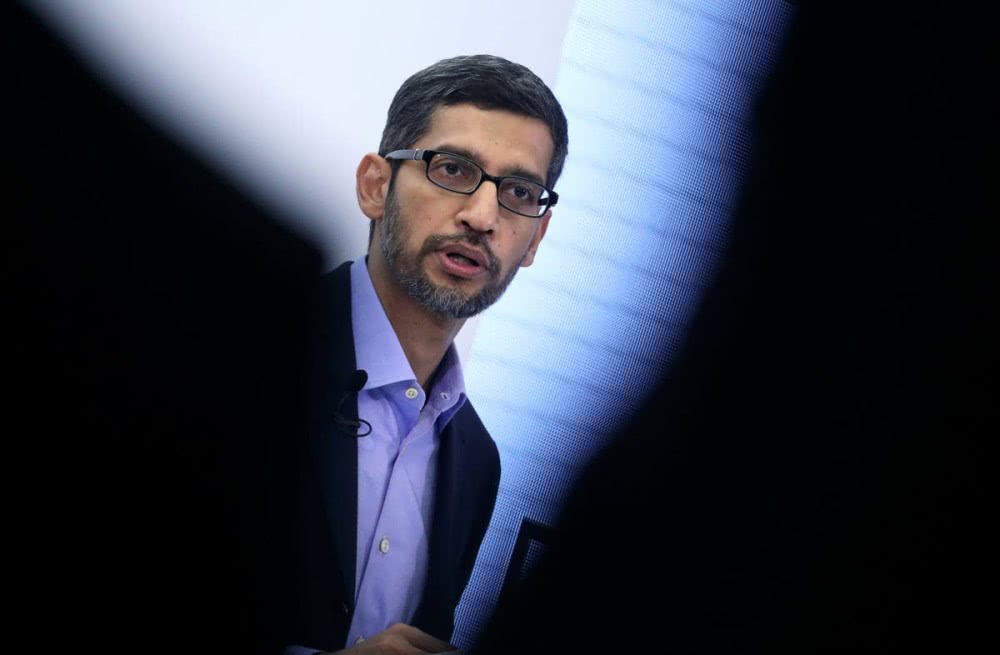The introduction of relevant regulations has far-reaching effects on many industries, especially for technology giants such as Google, Facebook and Apple who have bet heavily on artificial intelligence.
Editor’s note: This article comes from Tencent Technology , reviewing and judging.

Alphabet CEO Sundar Pichai talked about artificial intelligence at a conference in Brussels last month
February 17, according to foreign media reports, as the EU began to draft regulations for artificial intelligence and the digital economy, Facebook, Google and Apple executives have visited Brussels, hoping that the EU ’s stricter regulations will not stifle Innovation affects the development of its own business.
First, Sundar Pichai, CEO of Google ’s parent company Alphabet, came to Brussels, Belgium. Then, John Giannandrea, Apple’s senior vice president of artificial intelligence, also appeared here.
On Monday, Facebook CEO Mark Zuckerberg joined the trip to Brussels, with local executives such as European Commission Executive Vice President Margrethe Vestager Officials meet.
The main reason why so many Silicon Valley executives are gathered in Brussels is that EU lawmakers are debating whether to introduce a new digital policy that includes unprecedented rules on how companies use artificial intelligence. The introduction of relevant regulations has far-reaching effects on many industries, especially for technology giants such as Google, Facebook and Apple who have bet heavily on artificial intelligence.

Facebook CEO Mark Zuckerberg travels to Brussels on Monday to meet members of the European Commission.
“While artificial intelligence is expected to bring huge benefits to Europe and the world, people do worry about its possible negative effects,” Pichai said in a speech during a visit to Brussels last month. He said that the need for appropriate regulation of artificial intelligence. But Pichai added that “a balance needs to be found” to ensure that the rules do not stifle innovation.
Silicon Valley executives are taking action as more technology policies and more standards are set for regulation in Europe. In recent years, the European Union has passed laws and regulations on digital privacy and punished Google and other companies on antitrust issues, which has also prompted other parts of the world to take tougher actions against technology giants. The new artificial intelligence policy may also be a template for other countries and regions to follow suit.
For technical experts, business leaders, and government officials, artificial intelligence is one of the most transformative technologies in the world. However, it also brings new risks to personal privacy and daily life, including the possibility that technology will replace people’s work.
The first draft of the artificial intelligence policy, coordinated by Vestagel, will be made public on Wednesday, along with broader recommendations outlining the EU’s digital strategy for the next few years. EU lawmakers will debate these policies, including discussions on how to expand Europe’s domestic technology industry, which is expected to continue throughout 2020.

Margrethe Vestager, Executive Vice President of the European Commission, coordinates the first draft of European artificial intelligence policy.
The policy proposal on artificial intelligence is expected to outline the high-risk applications of the technology in areas such as healthcare and autonomous vehicles, and how these applications will be subject to stricter government scrutiny.
In an interview, Vestagel said that artificial intelligence is one of the most promising technologies in the world, but it also has many dangers because it needs to trust complex algorithms that make decisions based on large amounts of data. She said that there must be privacy protections, rules to prevent technology from discriminating, and ensuring thatCompanies using these systems can explain the requirements for how they work.
Westgarr is particularly concerned about the widespread use of facial recognition technology and said that new restrictions may be needed before the technology is “ubiquitous.”
Westgarr said she looks forward to Zuckerberg’s visit. She said that although she would love to hear his thoughts on artificial intelligence and digital policy, Europe would not wait passively.
“We will do our best to avoid unintended consequences,” Westgar said. “But obviously there will be expected consequences.”
Facebook declined to comment.
Europe is developing artificial intelligence policies under the guidance of Ursula von der Leyen, the new president of the European Commission. Von Delane, who took office in November last year, gave Westgar a 100-day deadline for her to announce a preliminary proposal on artificial intelligence before the deadline.
The time constraints can’t help but worry that these regulations are too hasty. Artificial intelligence is not single, its use often depends on the field of application, and its effectiveness depends largely on data from different sources. Some in the tech industry have warned that too broad regulation could hinder the benefits of artificial intelligence, such as diagnosing diseases, making self-driving cars, or building more efficient energy networks.
Ian Hogarth, a London-based angel investor focused on artificial intelligence, said: “This is an opportunity to play a leadership role, but not just regulatory work.” “Only from a regulatory perspective, It ’s difficult to make a breakthrough. “
The EU’s debate on artificial intelligence also means that Europe is gradually moving away from the US-dominated technology perspective. For many years, U.S. lawmakers and regulators have basically not interfered with the development of Silicon Valley companies, allowed them to grow unhindered, and have rarely examined issues such as the dissemination of false information on social networks.
Policy makers in Europe and elsewhere are stepping in, taking a more hands-on approach, setting boundaries for privacy, antitrust, and harmful content on the Internet. Last week, the United Kingdom announced plans to regulate Internet content through the establishment of a new government regulator.
Professor Wendy Hall, a computer scientist at Southampton University and a former British government artificial intelligence adviser, said: “Technology is dividing along geopolitical lines.”
In the interview, Vestalgel compared Europe’s tougher stance on technology regulation to its regulation of agriculture. Many pesticides and chemicals permitted in the United States are banned in Europe.
She said: “In Europe, if things are at risk, then our society as a whole wants to regulate it.” “On usThe most important thing is to create a society where people feel they can be sure of what happened. “
European policymakers have a variety of ideas in the process of drafting artificial intelligence policies. A PwC report shows that since 2018, various organizations have published a total of 44 reports, making recommendations on the “ethics of artificial intelligence”.
In the United States, the government is focusing on funding research for artificial intelligence rather than drafting new regulations. The latest budget proposal released by the White House this month has reserved about $ 1.1 billion for such research.
Westagel said her policy will include increasing research funding, but will also create a framework to protect the areas where artificial intelligence could cause the most harm. She said that she was not worried about artificial intelligence recommending a song on Spotify or recommending a movie on Netflix, and she focused on artificial intelligence algorithms that determine who can get a loan or diagnose what disease.
During this process, many details of the proposal, such as how Europe intends to achieve its goal of maximizing the benefits of artificial intelligence, can cause heated debate. Civil society groups, banks, car manufacturers and healthcare providers are also expected to participate in the debate.
Ultimately, these rules will have a significant impact on Apple, Facebook and Google. In recent years, these technology giants have invested a lot of money in artificial intelligence and have been competing for the world’s top engineers in related fields. Artificial intelligence now appears in products such as Apple’s Siri and Face ID, and also powers Google’s search engine, self-driving cars, and Facebook’s advertising business.
Apple declined to comment. A Google spokesperson mentioned what Pichai had said.
Pichai visited Brussels last month. Someone asked him what the artificial intelligence rules in the area should look like. He warned that if Europe does too much, it will have lasting effects on the economy.
“The ability of European industries to adopt and transform artificial intelligence to meet their own needs is critical to the future of continental Europe.” Pichai said at the time, “It is important to remember this.”